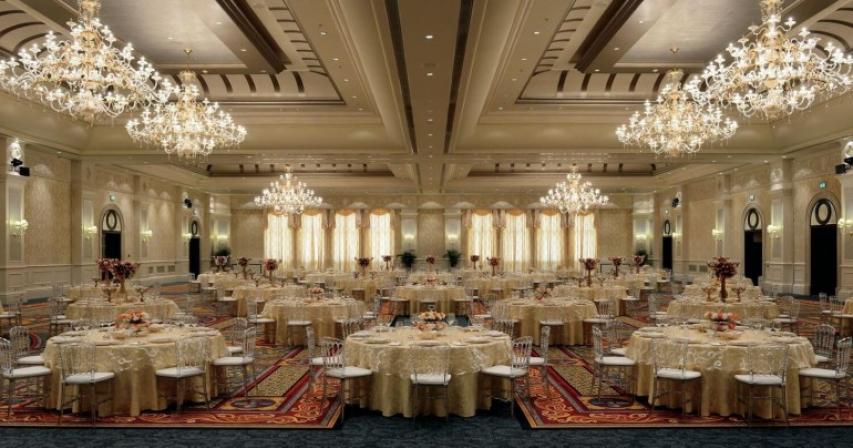UAE couples save up to 80% with mass weddings, joint ceremonies

Mass weddings are an age-old tradition for the Emiratis; however, this trend is also catching up with the expatriates.
As UAE couples strive to celebrate their wedding joyous occasions, they seek mass weddings, joint ceremonies to cut down financial load. It combines several couples into one great occasion and has numerous economic advantages. According to professional opinion polls, it is very economical to incorporate smaller weddings into one larger event; almost 70 - 80 % of the total budget of the smaller weddings can be saved.
Mass weddings, though common among the Emiratis and enjoyed by the support of government programs, expatriates also are adopting this style of marriage as a realistic approach to the rising costs of conducting a wedding ceremony and reception.
“Encouraging mass weddings does help cut costs and does cater for economies of scale. Costs for wedding halls and hotel rooms, for decorations and entertainment, technical aspects like sound, light, photos and videos do make eating up money,” Gauri Chadha, creative director at Big Night Events (BNE), noted.
As per Singh’s understanding, this option of staged mass weddings has increasingly gained acceptance from the younger recently wedded people. “Applying the principle of amalgamation of wedding functions saved almost 70 or up to 80 percent of the total expenditures expected for two separate weddings,” she explained.
Nonetheless, Chadha recognizes that juggling multiple couples on the same day comes with a lot of arrangement so that no couple is overlooked. “No two brides and grooms are the same and one must not forget that the day is a once in a life event,” the planner noted. “For example, when we have an Indian wedding which usually has many such events, we can have the same ceremony at different times or have other events overlapping to serve all.”
Mass weddings have been one of the initiatives which have been offered support by government bodies. Maha B, an Emirati who has just gone to a concentric wedding, tells what happened. “There were four brides all together. All those women had pictures of the time with guests and spent an hour to greet people and celebrating with their husbands. Everybody gets a turn in the pomposity of her ‘power,’” she said.
Maha equally brought up issues of cost savings. “The rental of the hall was only Dh500 but making the decorations and the banquet could cost even five up to hundred thousand Dirham. Because of this cost they only had to pay Dh25,000.”
In as much as any one bride would have different opinions, in what concerns the dresses, Maha observed that they all maintained the same vision which was to look good, elegant and is suitable for everyone.
People cannot dispute the food given since it is basic, as is the custom with every wedding. The decoration could be very basic with browns and whites, which everyone seems to agree on,” she added.
Marriage without Cost
In this regard, the Dubai Women’s Association is addressing the issue of the high cost of individual marriages by encouraging mass weddings. Such a project is called Zaffat Harayer, as explained by its director, Afra Al Hai, for the consulting and training department “When the UAE reached its fiftieth year. We had a wedding of 50 couples on that day. The same will be done this year and will be followed by several mass weddings.”
On Tuesday, the Dubai Women’s Association held the 26th “Zaffat Harayer” mass wedding which took place at Sheikh Rashid Hall, Trade Centre. A wedding of 14 grooms and brides took place wherein each couple’s wedding expenses from the wedding venue, attire for each bride and groom, invitation, catering, and cultural dance performances were all provided for by the association.
For the first time, actual ceremonies are going to be held in the afternoon. This change follows some orders from the leaders of the UAE aimed at sﻥǣrᐡ equitable dowry payments and marriage in total by ensuring the marriage ceremony will last for not more than four hours.
A collective wish
Likewise, it is not an exception among the general population. Indian siblings Aarush and Arjun also thought it reasonable to merge their wedding functions for enhanced economy. “Initially, I was supposed to be the first one turning out the veils, but I suggested that we hold on for a year so that we hold both of our ceremonies,” he said. Therefore, his wife was a little more anxious about fighting a war when she turned right away but when she did the calculations, they found it totally reasonable. “We both reduced the best optimization by roughly Dh50,000 more,” he said, and in such a way, the functions turned out to be so impressive.
Also for that matter, Alia Mahmoud and Razan Mustafa of Sudanese nationality are working on having a joint wedding with their spouses-to-be. “Not only will this cost us nearly Dh20,000 each elimination but this will also be our happiness,” they said.
They have already done catering reservations and are looking for a musician recognizing that music is always the greatest cost in weddings. However, for other Sudanese traditional ceremonies, Alia and Razan have plans to complete the arrangements of the different ceremonies in an effort to get enough attention from the guests.






Comments